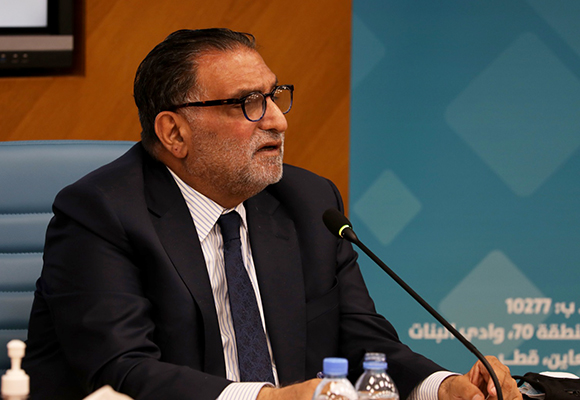 On Sunday, 21 March 2021, the eighth annual ACRPS Social Sciences and Humanities Conference began with a public lecture by ACRPS Director General and Chairman of the DI Board of Trustees, Azmi Bishara, addressing the topic “State, Nation, and Governance: Interconnection and Differentiation”.
On Sunday, 21 March 2021, the eighth annual ACRPS Social Sciences and Humanities Conference began with a public lecture by ACRPS Director General and Chairman of the DI Board of Trustees, Azmi Bishara, addressing the topic “State, Nation, and Governance: Interconnection and Differentiation”.
Bishara prefaced his remarks with mention of the emergence and development of the modern state as a process of differentiation in the functions and institutions of central authority within a political entity encompassing persons both governing and governed. Differentiating the exclusive and sui generis political realm and the rise of politicians as a class, he then distinguished sovereignty from the person of the sovereign and the rule of law from their command, citizenship from the parish “flock,” and nationalism from the nation – all giving rise to a conception of the state as an entity independent of ruler and governance system.
Commencing his lecture with ideas and theories of the state, Bishara emphasized that the requirements of understanding the emergence, structure and functions of specific states impose the renouncing of dissonant or mutually exclusive theories. These include: class-based approaches to the state focused on the preservation of private property, with the modern state arising specifically with the capitalist system as a tool for managing the interests of the capital-owning class and suppression of other classes; “liberal approaches” limiting a state’s “social peace” interventions since society organizes itself without a state, violations of freedom and private property are rare, and self-organizing mechanisms of economy and society should enjoy precedence over expansion of state functions and agencies; “Weberian institutional approaches” to the state as modern, stand-alone entity concerned more with state structure and functions and the independence and rationality of the bureaucracy than with the state’s emergence; and “nationalist approaches” to states as expressions of nations aspiring to govern themselves in nation-states. Bishara then observed that in terms of theories of the state as such, “democratic state” simply indicates that a democratic system prevails therein.
Proceeding to draw a central distinction between state and governance system (or regime) he underlined how bureaucracies vary, between poor and rich countries and liberal and socialist regimes, in structure, size and efficiency. There is no state without a state apparatus i.e., without bureaucracy. Notwithstanding changing political systems, the latter forms the material basis for our perceptions of a state’s sustainability – but not the only basis since continuity of citizenship is a basic element of the state, beyond any changes in systems of governance. Citizenship is a compound of rights and duties following from an individual’s direct “membership” in the state, externally also designating nationality. The rights and duties of citizenship are the highest embodiment of sovereignty over a region and its inhabitants. Conceptually differentiating state and governance system, Bishara observed that through history the process of differentiation generates ever more complex entities – the meaning of development. In the case of liberal democracy, for example, it is difficult to distinguish system of governance from the state, not for any lack of differentiation but rather because difference is internally articulated in structure, while distinctions arise between authorities and institutions of government, and between the latter and governing personages (rulers).
Democratic systems do not differentiate themselves from state institutions, given that the institutions of democratic systems – parliament, government and the judiciary – are also state institutions. These institutions become structurally democratic, just as the army’s code becomes protection of the democratic system and submission to the decisions of the elected civilian institutions. Consequently, the democratic system paves the way for society to influence state institutions in an unprecedented way and incorporates many legal and extra-legal mechanisms to separate governing persons from institutions of state: rulers change while state institutions remain constant, as does the system itself. Bishara concluded by observing that the distinction between state and regime / system of governance arose with modernity; the symmetry that democracy creates between them is complex symmetry and reflected in the unity of the state and its distribution of powers. In authoritarian states in which the distinction between the state and regime is clearly drawn, institutions of state are enfeebled in favor of forces of the ruling regime. If state unity should be imposed by force from above, the possibility of cracks and fissures may emerge when regimes change.
Bishara defined the modern state as one whose components, regardless of the ruling regime, consist of a monopoly on violence and legislation, the existence of a bureaucratic state apparatus, sovereignty over a particular territory and a specified population, and citizenship: a compound of rights and duties resulting from membership in the state. He concluded that a realist approach to the state in Arab countries requires distinguishing between nationalism, the nation, and the state – without however diminishing the importance of any one of those.